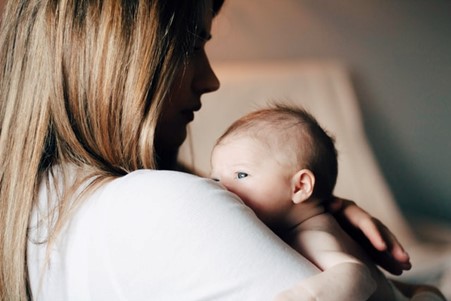Joelle Laguillo Bernheimer is a health and fitness professional that specializes in women’s health and wellness. In the following article, Joelle Laguillo explains the benefits new mothers can experience with exercising shortly after pregnancy for physical and mental well-being.
Post-partum depression creates a dangerous cycle. This perfectly normal symptom of childbirth often convinces new parents that something is wrong with them, or that they’re bad mothers, a belief which only worsens their depression. They must find a way to break out of the loop.
Routine exercise, beginning at least a few days after childbirth, can reduce post-partum depression while also promoting health benefits that will assist in recovery from more generalized mental health issues if necessary. The key is simply not to overdo it while still recovering from the physical stress of pregnancy says Joelle Laguillo Bernheimer.
Given the general benefits of regular exercise, this should come as no surprise. It makes even more sense, however, when considering the specific symptoms of post-partum depression.
Post-Partum Depression vs. Baby Blues
To overcome post-partum depression, Joelle Laguillo Bernheimer explains that one must first distinguish it from general symptoms exhibited by new mothers within the first 15-30 days following childbirth. Symptoms experienced by both depressive and non-depressive mothers alike may include:
- Insomnia or sleep disruptions
- Anxiety
- Mood swings
- Unexpected crying
- Irritability
- Lack of focus
- Loss of appetite
Joelle Laguillo says that these symptoms in their mildest forms are often referred to as the “baby blues.” True post-partum depression will usually involve more severe versions of these symptoms, along with:
- Feeling distant from one’s own child
- Isolation from loved ones
- Numbness toward favorite hobbies or activities
- Severe panic attacks
- Suicidal ideation, or fantasies about harming the child
- Intense feelings of guilt or shame, often associated with fear of not being a good enough mother
 How Exercise Benefits New Mothers
How Exercise Benefits New Mothers
Lack of activity alone does not cause post-partum depression, but rather a combination of variables. The body puts out a lot of hormones in the process of creating a new person. After pregnancy, Joelle Laguillo says that hormone levels drop suddenly. As this happens, the fallout from nine months of physical and mental stress compounds with the sudden need to remain rested for several days.
In simpler terms, the body undergoes massive changes, during which mothers are imbued with a sense of purpose. Upon delivering the baby, Joelle Bernheimer says that a mother’s life becomes a series of constant challenges which must be faced daily without the previous sense of meaning and accomplishment. It’s incredible that only one of seven mothers experience post-partum depression as a result.
Besides the usual increase of dopamine and serotonin, regular exercise reduces these issues in several ways. First, Joelle Laguillo Bernheimer says that exercise provides a distraction from the depressive symptoms wreaking havoc in new mothers’ heads. Second, it eases mothers’ doubts about their self-worth by alleviating other post-natal issues such as weight gain, back pain, joint fatigue, and incontinence.
Most importantly, however, exercising after pregnancy reminds new mothers that not all semblance of their old, independent life has been washed away. Joelle Laguillo Bernheimer explains that women, post-baby can and should still engage in activities geared toward their own health and enjoyment. A mother cannot effectively bond with her child if she lacks the fortitude to bond with herself.
Good Exercises for Post-Partum Depression
The best time to begin post-partum exercise varies depending on the source explains Joelle Laguillo. Some suggest mothers allow 2-4 weeks for their body to make a full recovery from pregnancy, while others suggest beginning a low-impact exercise regimen after just a few days of rest.
Regardless of when new mothers begin their exercise routine, the Mayo Clinic recommends a few specific exercises that will help with post-partum depression, as well as other post-natal symptoms. These exercises and their associated benefits include:
- Daily walks, for low-impact cardio to start the production of dopamine and serotonin
- Post-partum aerobics classes at the gym, to get exercise while combating isolation
- Kegel exercises, to tighten the pelvic muscles and reduce incontinence
- Yoga, specifically the “happy baby” pose, to relieve pain and increase relaxation
- Pelvic tilts, to reduce post-natal back pain
Post-Partum Exercise and Infant Health
Breastfeeding mothers may worry that the production of lactic acid during exercise could prove harmful to the baby. This is likely an uncommon occurrence. However, those who wish to avoid the risk can organize their exercise routine around their child’s feeding schedule.
Joelle Bernheimer says that this adds an extra benefit to post-partum exercise overall. By scheduling workouts to take place after regular feedings, new mothers may start to achieve a sense of structure. This reduces the sense of chaos often associated with raising a newborn child. Mothers should simply be aware that the baby is not privy to their day planner, so flexibility will be needed.
Finally, mothers who choose to engage in post-partum exercise should remain diligently hydrated. Nursing mothers use up a lot of water when producing enough milk to feed their child says Joelle Bernheimer. Even without exercise, breastfeeding mothers should typically aim to drink at least eight glasses of water per day. It would be prudent to add an extra glass or two during workouts.
Conclusion
Breaking out of post-partum depression may rightfully seem easier said than done explains Joelle Laguillo Bernheimer. Naturally, those experiencing strong suicidal ideation or other severe symptoms should seek outside help. While at home, however, managing symptoms becomes much easier when incorporating regular exercise into the parent’s daily routine. Every child deserves a healthy mother.











